ANSI C grammar, Lex specification
In 1985, Jeff Lee published this Lex specification together with a Yacc
grammar for the April 30, 1985 ANSI C draft.
Tom Stockfisch reposted
both to net.sources in 1987; that original, as mentioned in the answer
to question 17.25 of the comp.lang.c FAQ, can be ftp'ed from ftp.uu.net,
file usenet/net.sources/ansi.c.grammar.Z.
I intend to keep this version as close to the current C Standard grammar
as possible; please let me know if you discover discrepancies.
Jutta Degener, 1995
D
L
H
E
FS
IS
%{
#include
#include "y.tab.h"
void count();
%}
%%
"/*"
"auto"
"break"
"case"
"char"
"const"
"continue"
"default"
"do"
"double"
"else"
"enum"
"extern"
"float"
[0-9]
[a-zA-Z_]
[a-fA-F0-9]
[Ee][+-]?{D}+
(f|F|l|L)
(u|U|l|L)*
{ comment(); }
{ count(); return(AUTO); }
{ count(); return(BREAK); }
{ count(); return(CASE); }
{ count(); return(CHAR); }
{ count(); return(CONST); }
{ count(); return(CONTINUE); }
{ count(); return(DEFAULT); }
{ count(); return(DO); }
{ count(); return(DOUBLE); }
{ count(); return(ELSE); }
{ count(); return(ENUM); }
{ count(); return(EXTERN); }
{ count(); return(FLOAT); }
�
"for"
"goto"
"if"
"int"
"long"
"register"
"return"
"short"
"signed"
"sizeof"
"static"
"struct"
"switch"
"typedef"
"union"
"unsigned"
"void"
"volatile"
"while"
{ count(); return(FOR); }
{ count(); return(GOTO); }
{ count(); return(IF); }
{ count(); return(INT); }
{ count(); return(LONG); }
{ count(); return(REGISTER); }
{ count(); return(RETURN); }
{ count(); return(SHORT); }
{ count(); return(SIGNED); }
{ count(); return(SIZEOF); }
{ count(); return(STATIC); }
{ count(); return(STRUCT); }
{ count(); return(SWITCH); }
{ count(); return(TYPEDEF); }
{ count(); return(UNION); }
{ count(); return(UNSIGNED); }
{ count(); return(VOID); }
{ count(); return(VOLATILE); }
{ count(); return(WHILE); }
{L}({L}|{D})*
{ count(); return(check_type()); }
0[xX]{H}+{IS}?
0{D}+{IS}?
{D}+{IS}?
L?'(\\.|[^\\'])+'
{ count(); return(CONSTANT); }
{ count(); return(CONSTANT); }
{ count(); return(CONSTANT); }
{ count(); return(CONSTANT); }
{D}+{E}{FS}?
{ count(); return(CONSTANT); }
{D}*"."{D}+({E})?{FS}? { count(); return(CONSTANT); }
{D}+"."{D}*({E})?{FS}? { count(); return(CONSTANT); }
L?\"(\\.|[^\\"])*\"
{ count(); return(STRING_LITERAL); }
"..."
">>="
"<<="
"+="
"-="
"*="
"/="
"%="
"&="
"^="
"|="
{ count(); return(ELLIPSIS); }
{ count(); return(RIGHT_ASSIGN); }
{ count(); return(LEFT_ASSIGN); }
{ count(); return(ADD_ASSIGN); }
{ count(); return(SUB_ASSIGN); }
{ count(); return(MUL_ASSIGN); }
{ count(); return(DIV_ASSIGN); }
{ count(); return(MOD_ASSIGN); }
{ count(); return(AND_ASSIGN); }
{ count(); return(XOR_ASSIGN); }
{ count(); return(OR_ASSIGN); }
�
">>"
"<<"
"++"
"--"
"->"
"&&"
"||"
"<="
">="
"=="
"!="
";"
("{"|"<%")
("}"|"%>")
","
":"
"="
"("
")"
("["|"<:")
("]"|":>")
"."
"&"
"!"
"~"
"-"
"+"
"*"
"/"
"%"
"<"
">"
"^"
"|"
"?"
{ count(); return(RIGHT_OP); }
{ count(); return(LEFT_OP); }
{ count(); return(INC_OP); }
{ count(); return(DEC_OP); }
{ count(); return(PTR_OP); }
{ count(); return(AND_OP); }
{ count(); return(OR_OP); }
{ count(); return(LE_OP); }
{ count(); return(GE_OP); }
{ count(); return(EQ_OP); }
{ count(); return(NE_OP); }
{ count(); return(';'); }
{ count(); return('{'); }
{ count(); return('}'); }
{ count(); return(','); }
{ count(); return(':'); }
{ count(); return('='); }
{ count(); return('('); }
{ count(); return(')'); }
{ count(); return('['); }
{ count(); return(']'); }
{ count(); return('.'); }
{ count(); return('&'); }
{ count(); return('!'); }
{ count(); return('~'); }
{ count(); return('-'); }
{ count(); return('+'); }
{ count(); return('*'); }
{ count(); return('/'); }
{ count(); return('%'); }
{ count(); return('<'); }
{ count(); return('>'); }
{ count(); return('^'); }
{ count(); return('|'); }
{ count(); return('?'); }
[ \t\v\n\f]
.
{ count(); }
{ /* ignore bad characters */ }
%%
yywrap()
{
return(1);
�
}
comment()
{
char c, c1;
loop:
while ((c = input()) != '*' && c != 0)
putchar(c);
if ((c1 = input()) != '/' && c != 0)
{
unput(c1);
goto loop;
}
if (c != 0)
putchar(c1);
}
int column = 0;
void count()
{
int i;
for (i = 0; yytext[i] != '\0'; i++)
if (yytext[i] == '\n')
column = 0;
else if (yytext[i] == '\t')
column += 8 - (column % 8);
else
column++;
ECHO;
}
int check_type()
{
/*
* pseudo code --- this is what it should check
�
*
*
*
*
*
*/
/*
*
*/
}
if (yytext == type_name)
return(TYPE_NAME);
return(IDENTIFIER);
it actually will only return IDENTIFIER
return(IDENTIFIER);
ANSI C Yacc grammar
In 1985, Jeff Lee published his Yacc grammar (which is accompanied by a
matching Lex specification) for the April 30, 1985 draft version of the
ANSI C standard.
Tom Stockfisch reposted it to net.sources in 1987; that
original, as mentioned in the answer to question 17.25 of the comp.lang.c
FAQ, can be ftp'ed from ftp.uu.net, file
usenet/net.sources/ansi.c.grammar.Z.
Jutta Degener, 1995
%token IDENTIFIER CONSTANT STRING_LITERAL SIZEOF
%token PTR_OP INC_OP DEC_OP LEFT_OP RIGHT_OP LE_OP GE_OP EQ_OP NE_OP
%token AND_OP OR_OP MUL_ASSIGN DIV_ASSIGN MOD_ASSIGN ADD_ASSIGN
%token SUB_ASSIGN LEFT_ASSIGN RIGHT_ASSIGN AND_ASSIGN
%token XOR_ASSIGN OR_ASSIGN TYPE_NAME
%token TYPEDEF EXTERN STATIC AUTO REGISTER
%token CHAR SHORT INT LONG SIGNED UNSIGNED FLOAT DOUBLE CONST VOLATILE
VOID
%token STRUCT UNION ENUM ELLIPSIS
%token CASE DEFAULT IF ELSE SWITCH WHILE DO FOR GOTO CONTINUE BREAK RETURN
%start translation_unit
%%
�
primary_expression
: IDENTIFIER
| CONSTANT
| STRING_LITERAL
| '(' expression ')'
;
postfix_expression
: primary_expression
| postfix_expression '[' expression ']'
| postfix_expression '(' ')'
| postfix_expression '(' argument_expression_list ')'
| postfix_expression '.' IDENTIFIER
| postfix_expression PTR_OP IDENTIFIER
| postfix_expression INC_OP
| postfix_expression DEC_OP
;
argument_expression_list
: assignment_expression
| argument_expression_list ',' assignment_expression
;
unary_expression
: postfix_expression
| INC_OP unary_expression
| DEC_OP unary_expression
| unary_operator cast_expression
| SIZEOF unary_expression
| SIZEOF '(' type_name ')'
;
unary_operator
: '&'
| '*'
| '+'
| '-'
| '~'
| '!'
;
cast_expression
: unary_expression
| '(' type_name ')' cast_expression
�
;
multiplicative_expression
: cast_expression
| multiplicative_expression '*' cast_expression
| multiplicative_expression '/' cast_expression
| multiplicative_expression '%' cast_expression
;
additive_expression
: multiplicative_expression
| additive_expression '+' multiplicative_expression
| additive_expression '-' multiplicative_expression
;
shift_expression
: additive_expression
| shift_expression LEFT_OP additive_expression
| shift_expression RIGHT_OP additive_expression
;
relational_expression
: shift_expression
| relational_expression '<' shift_expression
| relational_expression '>' shift_expression
| relational_expression LE_OP shift_expression
| relational_expression GE_OP shift_expression
;
equality_expression
: relational_expression
| equality_expression EQ_OP relational_expression
| equality_expression NE_OP relational_expression
;
and_expression
: equality_expression
| and_expression '&' equality_expression
;
exclusive_or_expression
: and_expression
| exclusive_or_expression '^' and_expression
;
�
inclusive_or_expression
: exclusive_or_expression
| inclusive_or_expression '|' exclusive_or_expression
;
logical_and_expression
: inclusive_or_expression
| logical_and_expression AND_OP inclusive_or_expression
;
logical_or_expression
: logical_and_expression
| logical_or_expression OR_OP logical_and_expression
;
conditional_expression
: logical_or_expression
| logical_or_expression '?' expression ':'
conditional_expression
;
assignment_expression
: conditional_expression
| unary_expression assignment_operator assignment_expression
;
assignment_operator
: '='
| MUL_ASSIGN
| DIV_ASSIGN
| MOD_ASSIGN
| ADD_ASSIGN
| SUB_ASSIGN
| LEFT_ASSIGN
| RIGHT_ASSIGN
| AND_ASSIGN
| XOR_ASSIGN
| OR_ASSIGN
;
expression
: assignment_expression
| expression ',' assignment_expression
�
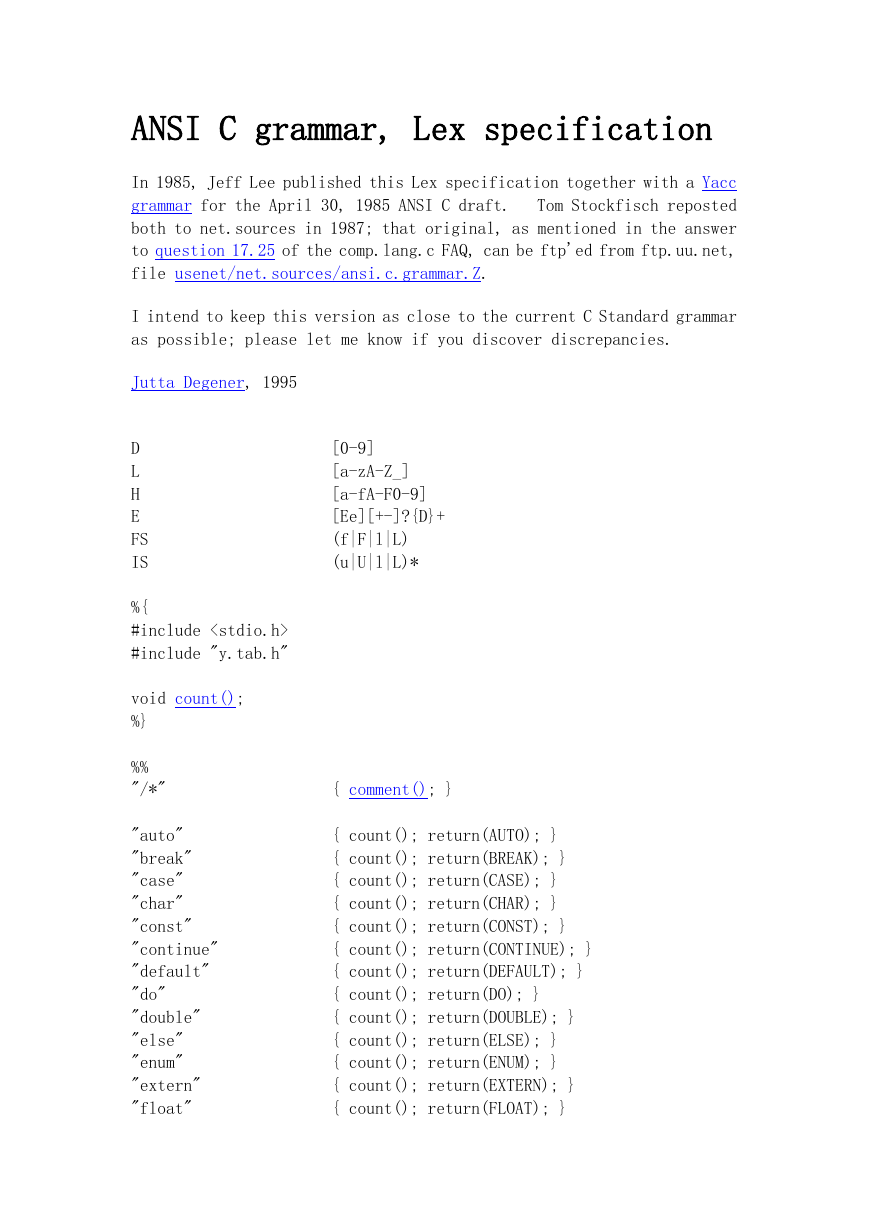
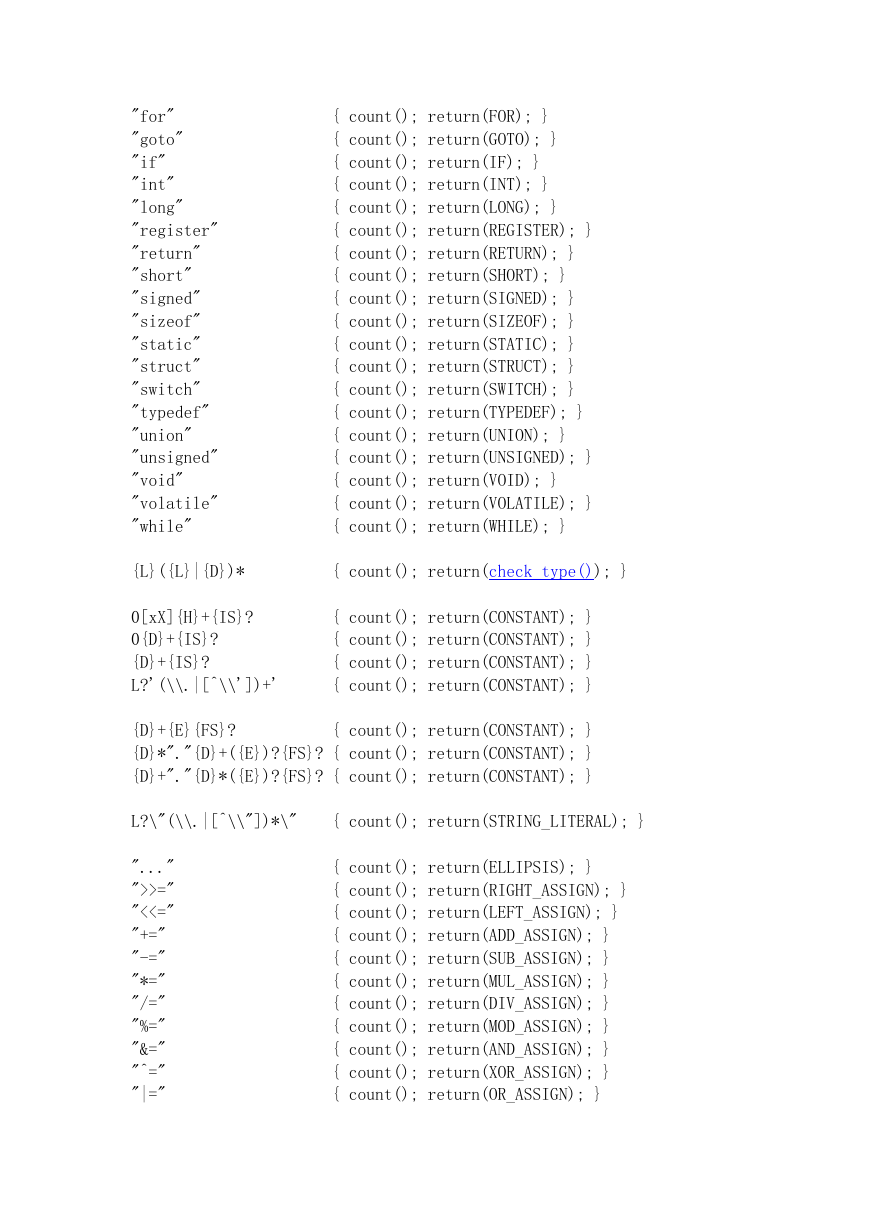
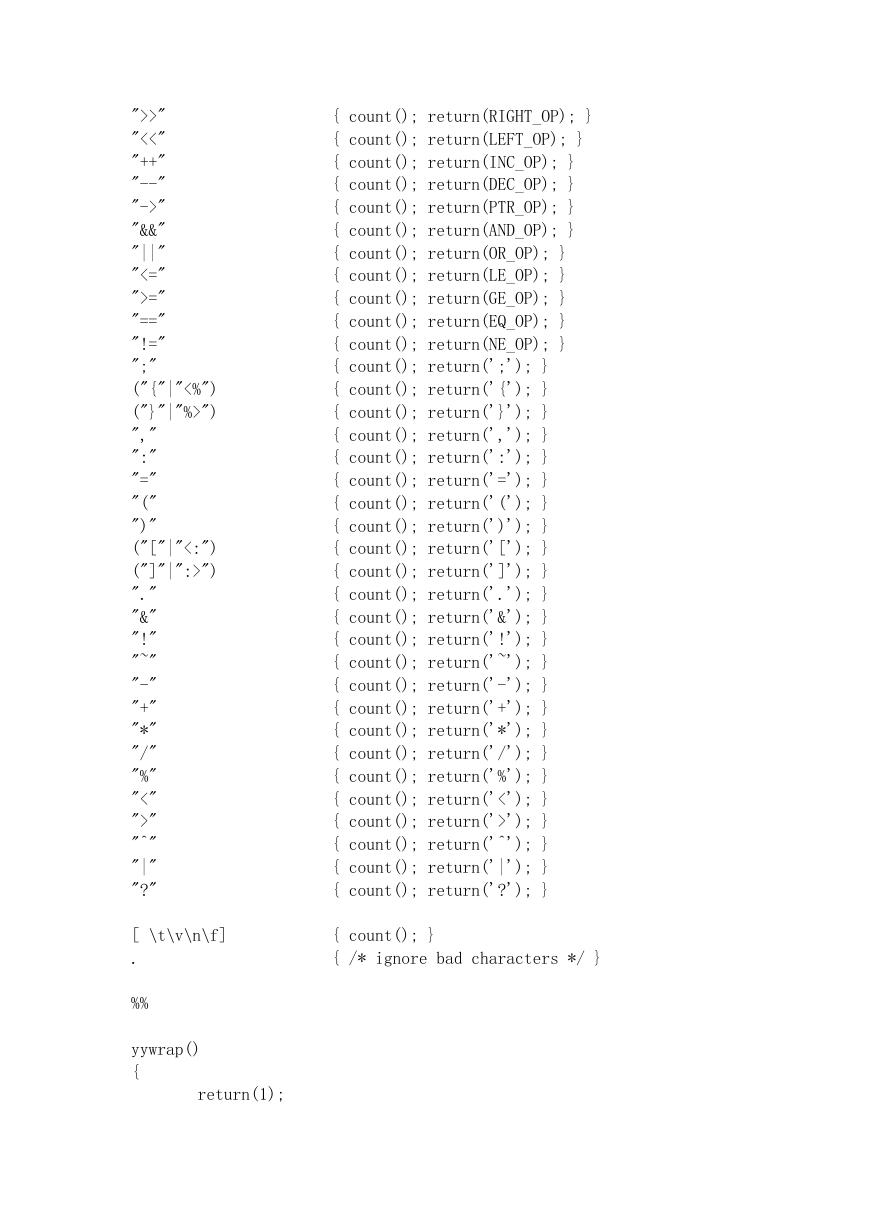
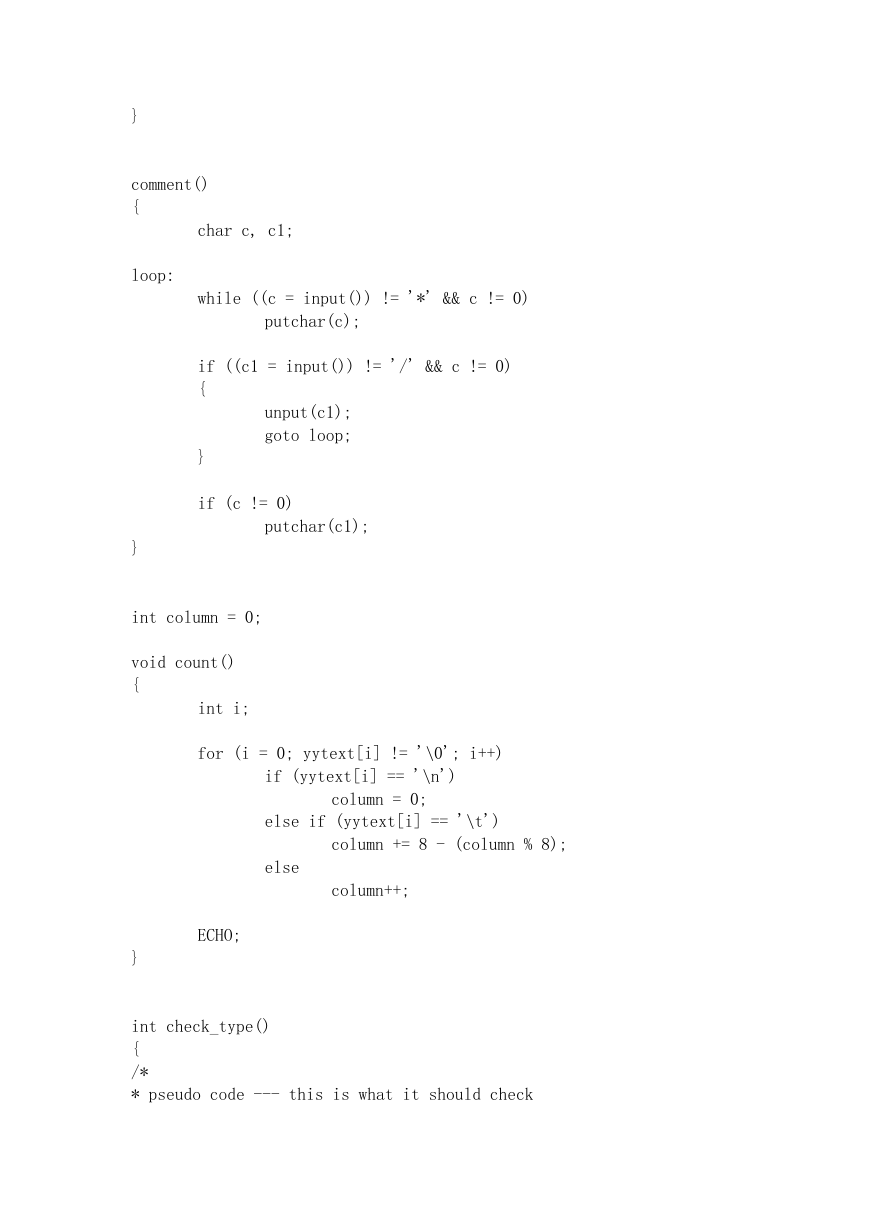
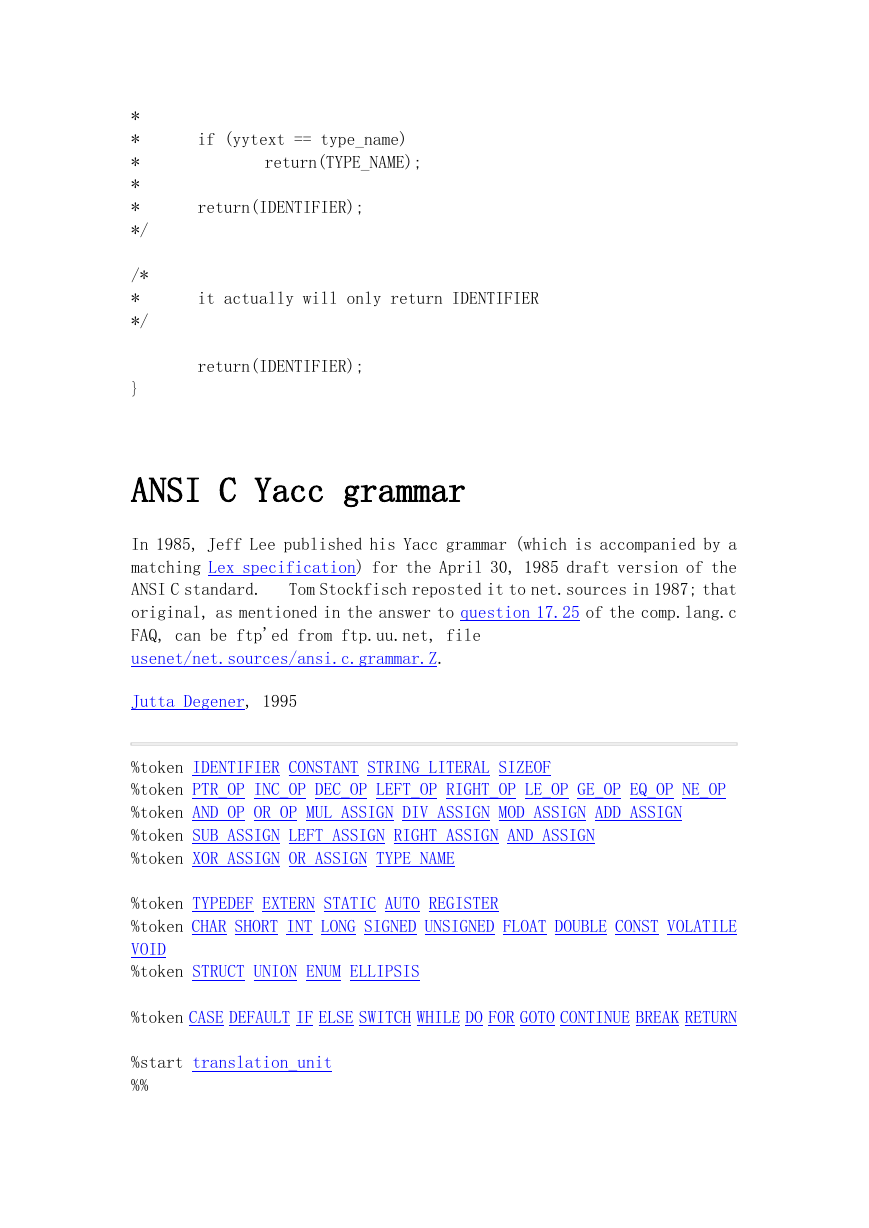

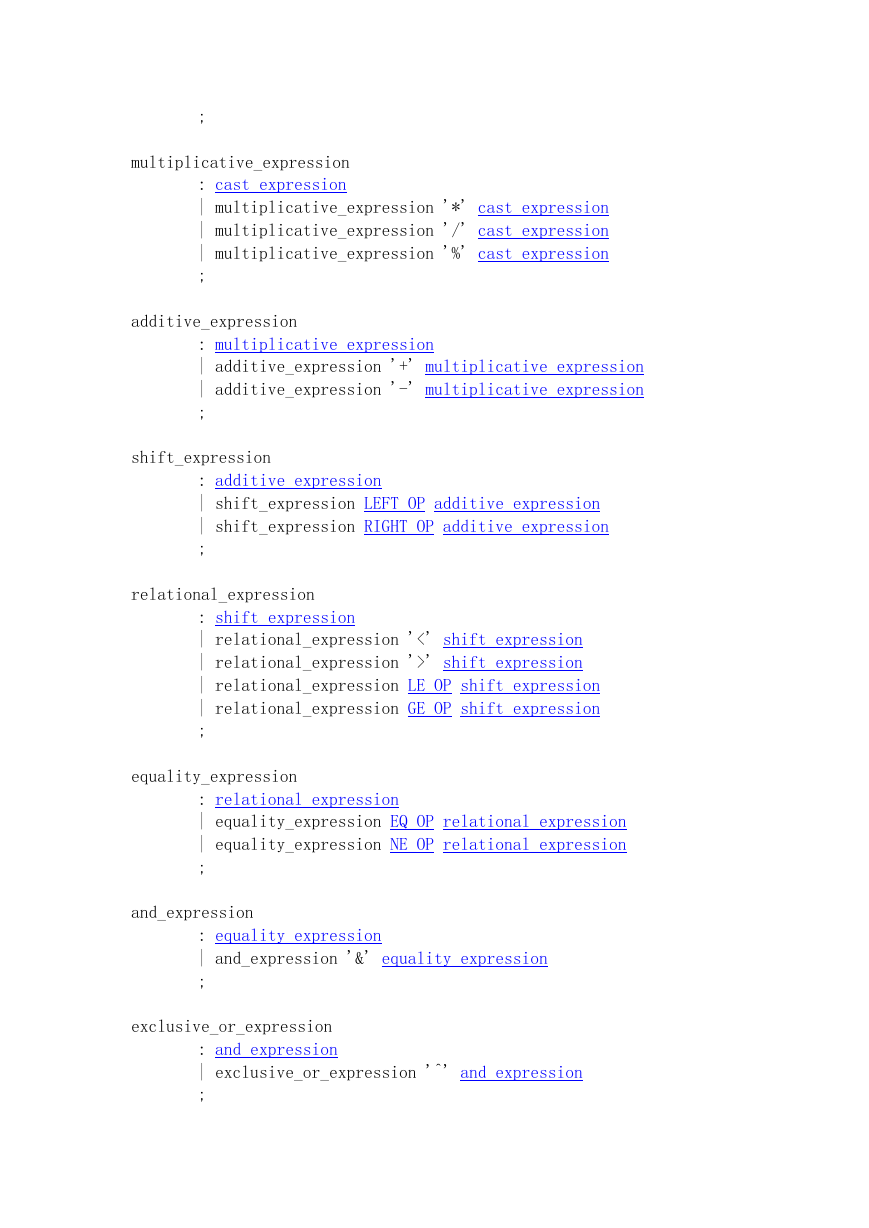
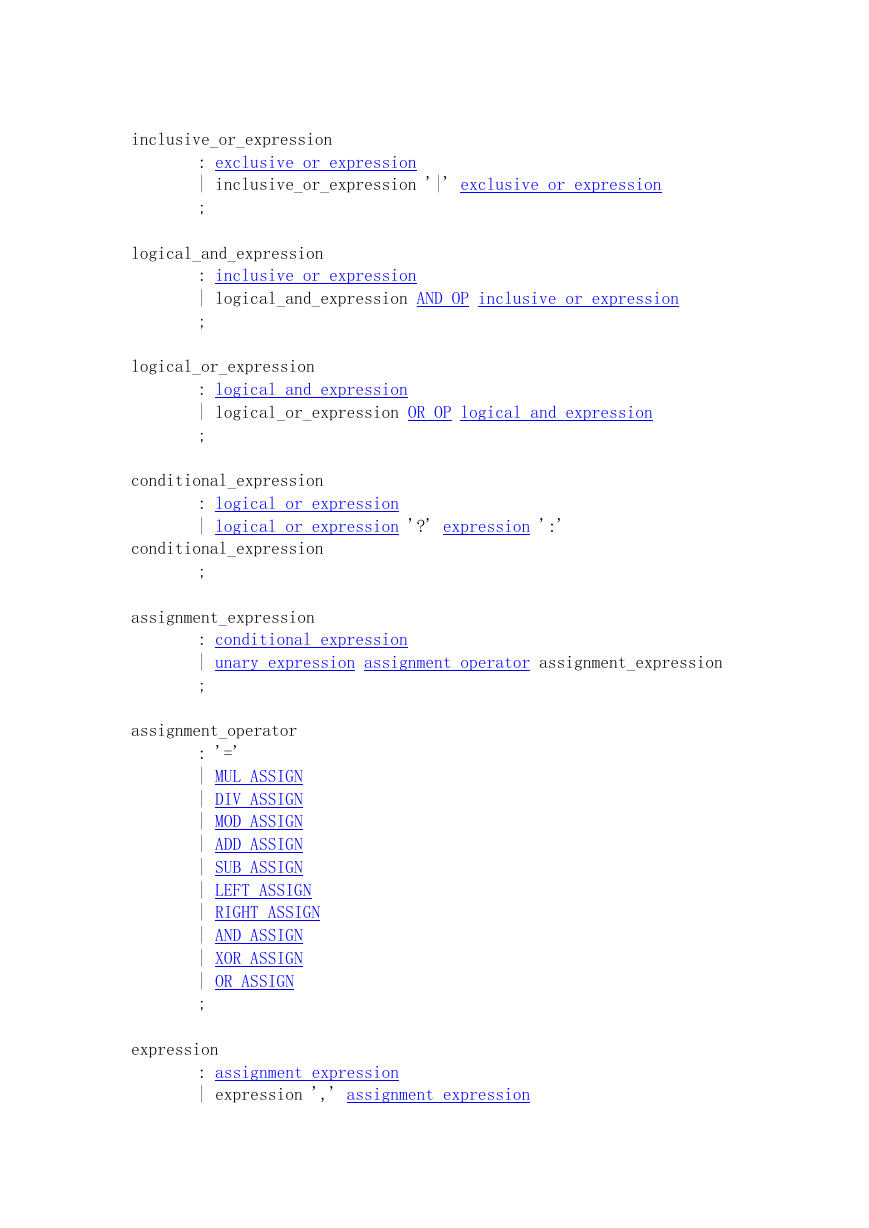








 2023年江西萍乡中考道德与法治真题及答案.doc
2023年江西萍乡中考道德与法治真题及答案.doc 2012年重庆南川中考生物真题及答案.doc
2012年重庆南川中考生物真题及答案.doc 2013年江西师范大学地理学综合及文艺理论基础考研真题.doc
2013年江西师范大学地理学综合及文艺理论基础考研真题.doc 2020年四川甘孜小升初语文真题及答案I卷.doc
2020年四川甘孜小升初语文真题及答案I卷.doc 2020年注册岩土工程师专业基础考试真题及答案.doc
2020年注册岩土工程师专业基础考试真题及答案.doc 2023-2024学年福建省厦门市九年级上学期数学月考试题及答案.doc
2023-2024学年福建省厦门市九年级上学期数学月考试题及答案.doc 2021-2022学年辽宁省沈阳市大东区九年级上学期语文期末试题及答案.doc
2021-2022学年辽宁省沈阳市大东区九年级上学期语文期末试题及答案.doc 2022-2023学年北京东城区初三第一学期物理期末试卷及答案.doc
2022-2023学年北京东城区初三第一学期物理期末试卷及答案.doc 2018上半年江西教师资格初中地理学科知识与教学能力真题及答案.doc
2018上半年江西教师资格初中地理学科知识与教学能力真题及答案.doc 2012年河北国家公务员申论考试真题及答案-省级.doc
2012年河北国家公务员申论考试真题及答案-省级.doc 2020-2021学年江苏省扬州市江都区邵樊片九年级上学期数学第一次质量检测试题及答案.doc
2020-2021学年江苏省扬州市江都区邵樊片九年级上学期数学第一次质量检测试题及答案.doc 2022下半年黑龙江教师资格证中学综合素质真题及答案.doc
2022下半年黑龙江教师资格证中学综合素质真题及答案.doc